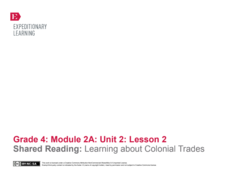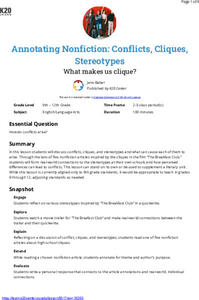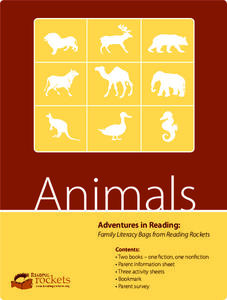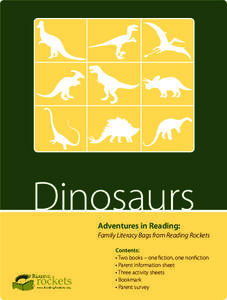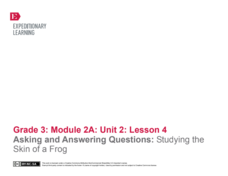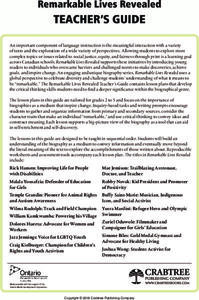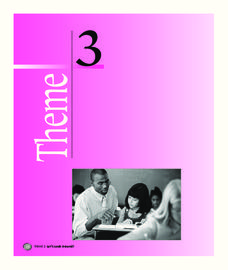EngageNY
Asking and Answering Questions: Reading about a Frog's Habitat
Building upon previous lessons, scholars take to asking and answering questions about a frog's habitat. A partner discussion follows a read-aloud of an informational text in preparation for a worksheet that boosts reading comprehension...
EngageNY
Shared Reading: Learning About Colonial Trades
Trading in Colonial America is the focus of a lesson plan that boosts reading skills. As a class, scholars examine the informational text for crucial details, use their newfound knowledge to share information with their peers, and write...
K20 LEARN
Annotating Nonfiction - Conflicts, Cliques, Stereotypes: What Makes Us Clique?
John Hughes' The Breakfast Club takes center stage in a instructional activity about annotating nonfiction texts to keep track of evidence that may be used later in discussions and writings. Scholars consider the stereotypes and...
EngageNY
Close Reading: Excerpt 2 of “The Digital Revolution and the Adolescent Brain Evolution”
Help scholars comprehend a challenging text. Using the resource, pupils read excerpts from an article about the digital revolution and adolescent brain development. As they read, they answer text-dependent questions and complete a close...
ReadWriteThink
Captioning the Civil Rights Movement: Reading the Images, Writing the Words
Scholars boost their knowledge of the Civil Rights Movement with a lesson that challenges writers, readers, and historians to analyze primary sources and caption their observations. By way of reading, writing, discussion, independently,...
K12 Reader
Uncle Tom’s Cabin: George’s Speech
Sometimes it takes a work of fiction to demonstrate nonfictional tragedies and events. George, an escaped slave, describes to Mr. Wilson the hardships of his life in a short passage from Harriet Beecher Stowe's novel, Uncle Tom's Cabin.
PBS
Reading Adventure Pack: Animals
Scholars explore the animal kingdom with help from two texts, Blueberries for Sal by Robert McCloskey and A Bed for the Winter by Karen Wallace. The literature and informational text set the learning stage for thoughtful discussion and...
DePaul University
Egypt
The country of Egypt is more than just big pyramids and ancient pharaohs. After reading a brief overview of this African nation, young learners will demonstrate their understanding of the text by identifying the main idea and supporting...
PBS
Reading Adventure Pack: Dinosaurs
Two books—Dinosaurs by Gail Gibbons and Danny and the Dinosaur by Syd Hof—begin a learning experience in which scholars complete three creative, imaginative, and real-world activities. First, pupils create a puzzle featuring their...
EngageNY
Reading for Fluency: Readers Theater about the Rainforest (Page 33)
Lights, camera, action. Scholars use page 33 of The Most Beautiful
Roof in the World to create a readers theater. They work in triads and use sticky notes to mark and create their own speaking parts from sections of the text. They then...
PBS
Reading Adventure Pack: Government
A reading adventure pack looks closely at government with the help of two books—one fiction, one nonfiction, and a series of activities. Learners craft a mobile to visualize a balanced government, participate in a scavenger hunt around...
EngageNY
Asking and Answering Questions: Studying the Skin of a Frog
English language arts and science combine in a lesson that focuses on asking and answering questions about frog skin. Discussion, a read-aloud, and partner work lead the way towards a three-page worksheet that tests learners'...
Crabtree Publishing
Remarkable Lives Revealed
Six lessons make up a unit all about biographies. Scholars read about a remarkable life while taking notes and identifying characteristics of the biographical genre. Readers examine the tale's obstacles, accomplishments, and sequence of...
Newsela
Understanding "A Long Walk to Water"
What is the secret to success? Scholars use close reading of a variety of articles to determine characteristics of people that overcame hardships to become successful. While reading, pupils annotate their copies, make claims, and...
EngageNY
Introduction: The Ideas of Charles Darwin
Piece by piece ... Scholars read the text World without Fish by breaking the text into pieces. They identify challenging words and determine the gist of each section as they read. They then work together in triads to answer...
ReadWriteThink
"Three Stones Back": Using Informational Text to Enhance Understanding of Ball Don't Lie
"Three Stones Back," a passage from Matt de la Pena's best-seller, Ball Don't Lie, allows readers to practice their close reading skills as they compare the passage to an information text about wealth inequality.
EngageNY
Grade 9 ELA Module 1, Unit 1, Lesson 5
Finding the central idea in a text is equally important in fiction and nonfiction. Work on analyzing a piece of writing for the central idea with Karen Russell's "St. Lucy's Home for Girls Raised by Wolves," complete with supporting...
EngageNY
Grade 10 ELA Module 4: Unit 3, Lesson 3
What's the difference between men and princes? Machiavelli discusses this distinction in chapter 18 of The Prince. Scholars first listen to a masterful reading of the chapter. Then, they write about how the author develops a central idea...
Curated OER
Nonfiction Genre Mini-Unit: Persuasive Writing
Should primary graders have their own computers? Should animals be kept in captivity? Young writers learn how to develop and support a claim in this short unit on persuasive writing.
EngageNY
Analyzing Text Structure: “The Shakespeare Shakedown”
Pupils continue reading and discussing Simon Schama's article "The Shakespeare Shakedown." They work together to analyze the article's paragraph structure, completing a note-catcher worksheet.
Conneticut Department of Education
Instructional Strategies That Facilitate Learning Across Content Areas
Imagine 28 instructional strategies, appropriate for all subject areas and all grade levels. Directed Reading-Thinking Activities (DRTA), Question-Answer Relationship (QAR) activities, KWL charts, comparison matrixes, classification...
Core Knowledge Foundation
Maya, Aztec, and Inca Civilizations
A 10-lesson unit explores the Maya, Aztec, and Inca civilizations. Over the course of two weeks, scholars read nonfiction excerpts, discuss their findings, and complete activities. An assessment equipped with multiple choice and matching...
Mark Twain Media
Understanding Informational Text Features
Everything you need to know about informational text features can be found in this resource. Recognizing these types of text features and how they are used in text allows readers to better understand information. Teachers can use this as...
Houghton Mifflin Harcourt
Let’s Look Around!: Challenge Activities (Theme 3)
Let's Look Around! is the theme of a unit that offers a plethora of challenge activities. Enhance your scholars' learning experiences and reinforce concepts with activities such as writing a book about farm animals, an imaginary place,...
Other popular searches
- Nonfiction Reading Skills
- Nonfiction Reading Passages
- Reading Nonfiction
- Reading Main Idea Nonfiction
- Teaching Nonfiction Reading
- Nonfiction Reading Test
- Nonfiction Reading Group
- Reading Nonfiction Books
- Nonfiction Reading Guide
- Reading Responses Nonfiction
- Nonfiction Reading Lessons
- Narrative Nonfiction Reading



